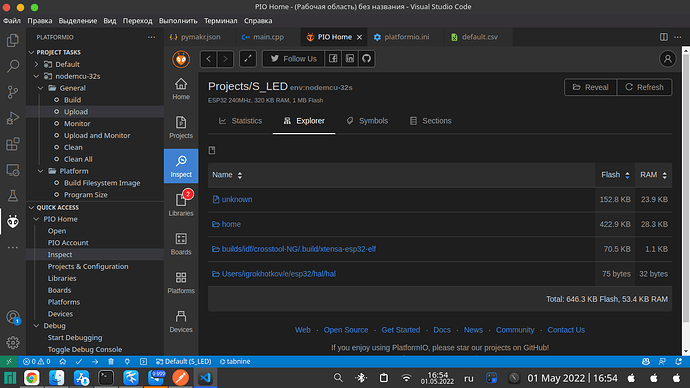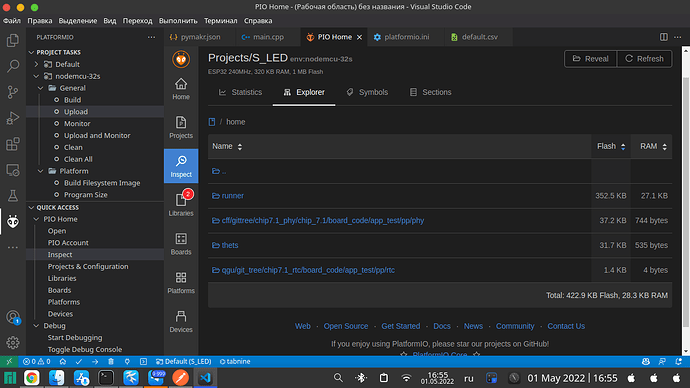Hi there!
I wrote a small code for NodeMCU-32S allowing to use OTA:
/* WebOTA.ino
*
* by Roland Pelayo
*
* Update ESP32 firmware via external web server
*/
#include <Arduino.h>
#include <WiFi.h>
#include <HTTPClient.h>
#include <Update.h>
// location of firmware file on external web server
// change to your actual .bin location
#define HOST "https://tsecret-github.github.io/ideal-octo-umbrella/firmware.bin"
const char *CA = R"EOF(
-----BEGIN CERTIFICATE-----
MIIDrzCCApegAwIBAgIQCDvgVpBCRrGhdWrJWZHHSjANBgkqhkiG9w0BAQUFADBh
MQswCQYDVQQGEwJVUzEVMBMGA1UEChMMRGlnaUNlcnQgSW5jMRkwFwYDVQQLExB3
d3cuZGlnaWNlcnQuY29tMSAwHgYDVQQDExdEaWdpQ2VydCBHbG9iYWwgUm9vdCBD
QTAeFw0wNjExMTAwMDAwMDBaFw0zMTExMTAwMDAwMDBaMGExCzAJBgNVBAYTAlVT
MRUwEwYDVQQKEwxEaWdpQ2VydCBJbmMxGTAXBgNVBAsTEHd3dy5kaWdpY2VydC5j
b20xIDAeBgNVBAMTF0RpZ2lDZXJ0IEdsb2JhbCBSb290IENBMIIBIjANBgkqhkiG
9w0BAQEFAAOCAQ8AMIIBCgKCAQEA4jvhEXLeqKTTo1eqUKKPC3eQyaKl7hLOllsB
CSDMAZOnTjC3U/dDxGkAV53ijSLdhwZAAIEJzs4bg7/fzTtxRuLWZscFs3YnFo97
nh6Vfe63SKMI2tavegw5BmV/Sl0fvBf4q77uKNd0f3p4mVmFaG5cIzJLv07A6Fpt
43C/dxC//AH2hdmoRBBYMql1GNXRor5H4idq9Joz+EkIYIvUX7Q6hL+hqkpMfT7P
T19sdl6gSzeRntwi5m3OFBqOasv+zbMUZBfHWymeMr/y7vrTC0LUq7dBMtoM1O/4
gdW7jVg/tRvoSSiicNoxBN33shbyTApOB6jtSj1etX+jkMOvJwIDAQABo2MwYTAO
BgNVHQ8BAf8EBAMCAYYwDwYDVR0TAQH/BAUwAwEB/zAdBgNVHQ4EFgQUA95QNVbR
TLtm8KPiGxvDl7I90VUwHwYDVR0jBBgwFoAUA95QNVbRTLtm8KPiGxvDl7I90VUw
DQYJKoZIhvcNAQEFBQADggEBAMucN6pIExIK+t1EnE9SsPTfrgT1eXkIoyQY/Esr
hMAtudXH/vTBH1jLuG2cenTnmCmrEbXjcKChzUyImZOMkXDiqw8cvpOp/2PV5Adg
06O/nVsJ8dWO41P0jmP6P6fbtGbfYmbW0W5BjfIttep3Sp+dWOIrWcBAI+0tKIJF
PnlUkiaY4IBIqDfv8NZ5YBberOgOzW6sRBc4L0na4UU+Krk2U886UAb3LujEV0ls
YSEY1QSteDwsOoBrp+uvFRTp2InBuThs4pFsiv9kuXclVzDAGySj4dzp30d8tbQk
CAUw7C29C79Fv1C5qfPrmAESrciIxpg0X40KPMbp1ZWVbd4=
-----END CERTIFICATE-----
)EOF";
HTTPClient client;
// Your WiFi credentials
const char* ssid = "SSID";
const char* password = "Password";
// Global variables
int totalLength; //total size of firmware
int currentLength = 0; //current size of written firmware
// Function to update firmware incrementally
// Buffer is declared to be 128 so chunks of 128 bytes
// from firmware is written to device until server closes
void updateFirmware(uint8_t *data, size_t len){
Update.write(data, len);
currentLength += len;
// Print dots while waiting for update to finish
Serial.print('.');
// if current length of written firmware is not equal to total firmware size, repeat
if(currentLength != totalLength) return;
Update.end(true);
Serial.printf("\nUpdate Success, Total Size: %u\nRebooting...\n", currentLength);
// Restart ESP32 to see changes
ESP.restart();
}
void setup() {
Serial.begin(115200);
// Start WiFi connection
WiFi.mode(WIFI_MODE_STA);
WiFi.begin(ssid, password);
while (WiFi.status() != WL_CONNECTED) {
delay(500);
Serial.print(".");
}
delay(10000);
Serial.println("");
Serial.println("WiFi connected");
Serial.println("IP address: ");
Serial.println(WiFi.localIP());
// Connect to external web server
if (!client.begin(HOST, CA)) {
digitalWrite(2, HIGH);
return;
}
// Get file, just to check if each reachable
int resp = client.GET();
Serial.print("Response: ");
Serial.println(resp);
// If file is reachable, start downloading
if(resp == 200){
// get length of document (is -1 when Server sends no Content-Length header)
totalLength = client.getSize();
// transfer to local variable
int len = totalLength;
// this is required to start firmware update process
Update.begin(UPDATE_SIZE_UNKNOWN);
Serial.printf("FW Size: %u\n",totalLength);
// create buffer for read
uint8_t buff[128] = { 0 };
// get tcp stream
WiFiClient * stream = client.getStreamPtr();
// read all data from server
Serial.println("Updating firmware...");
while(client.connected() && (len > 0 || len == -1)) {
// get available data size
size_t size = stream->available();
if(size) {
// read up to 128 byte
int c = stream->readBytes(buff, ((size > sizeof(buff)) ? sizeof(buff) : size));
// pass to function
updateFirmware(buff, c);
if(len > 0) {
len -= c;
}
}
delay(1);
}
}else{
Serial.println("Cannot download firmware file. Only HTTP response 200: OK is supported. Double check firmware location #defined in HOST.");
}
client.end();
}
void loop() {}
The problem is that the firmware is too big (823633 bytes or 823,633 KB).
I looked in Inspect and found out this information:
Home contains the following files(?):
- That is, what is it?
- Why does it contain ESP-IDF components?
- And can I make it smaller?
Here is the whole project for experimentation:
https://github.com/TSecret-GitHub/psychic-fiesta
It also seems to me that the framework-arduinoespressif32 takes up too much space (30.6 KB) can it be made smaller?
Thanks!

